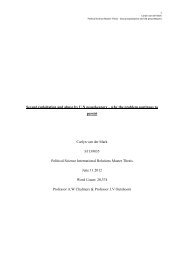The Impact of Armed Conflict on Women and Girls - UNFPA
The Impact of Armed Conflict on Women and Girls - UNFPA
The Impact of Armed Conflict on Women and Girls - UNFPA
Create successful ePaper yourself
Turn your PDF publications into a flip-book with our unique Google optimized e-Paper software.
Approaches<br />
<str<strong>on</strong>g>The</str<strong>on</strong>g> Defining Features <str<strong>on</strong>g>of</str<strong>on</strong>g> Reproductive Health Provisi<strong>on</strong> in <str<strong>on</strong>g>C<strong>on</strong>flict</str<strong>on</strong>g>s<br />
<str<strong>on</strong>g>C<strong>on</strong>flict</str<strong>on</strong>g> situati<strong>on</strong>s are never identical. <str<strong>on</strong>g>The</str<strong>on</strong>g> length <str<strong>on</strong>g>of</str<strong>on</strong>g> displacement varies<br />
c<strong>on</strong>siderably from short-term emergencies to increasingly l<strong>on</strong>g-term development<br />
situati<strong>on</strong>s. <str<strong>on</strong>g>The</str<strong>on</strong>g> settings in which refugees find themselves can also vary<br />
enormously, from huge camps to integrati<strong>on</strong> in an urban or rural setting.<br />
Forced migrati<strong>on</strong> presents a number <str<strong>on</strong>g>of</str<strong>on</strong>g> challenges in the provisi<strong>on</strong> <str<strong>on</strong>g>of</str<strong>on</strong>g><br />
reproductive health services, in additi<strong>on</strong> to the specific issues pertaining to each<br />
<str<strong>on</strong>g>of</str<strong>on</strong>g> the technical areas <str<strong>on</strong>g>of</str<strong>on</strong>g> reproductive health for refugees, covered in a later<br />
secti<strong>on</strong>.<br />
Most refugees are from countries where health indicators are already<br />
poor. In additi<strong>on</strong>, many people who end up leaving their home country have<br />
already been displaced internally or discriminated against prior to flight. Flight<br />
from war, civil or ethnic c<strong>on</strong>flict or natural disaster exacerbates existing health<br />
problems. In these situati<strong>on</strong>s, women, in particular, are vulnerable to sexual<br />
violence <strong>and</strong> abuse. Even <strong>on</strong>ce women reach relative safety, c<strong>on</strong>diti<strong>on</strong>s still<br />
prevail that further c<strong>on</strong>tribute to their ill-health: malnutriti<strong>on</strong> <strong>and</strong> epidemics; an<br />
absence <str<strong>on</strong>g>of</str<strong>on</strong>g> law <strong>and</strong> order; increased resp<strong>on</strong>sibility for households in the absence<br />
<str<strong>on</strong>g>of</str<strong>on</strong>g> male family members; <strong>and</strong> the breakdown <str<strong>on</strong>g>of</str<strong>on</strong>g> family structures.<br />
In additi<strong>on</strong>, the highly political nature <str<strong>on</strong>g>of</str<strong>on</strong>g> complex emergencies can make<br />
the provisi<strong>on</strong> <str<strong>on</strong>g>of</str<strong>on</strong>g> reproductive health care an especially sensitive issue. It is,<br />
therefore, important to ensure that services reach the host/local populati<strong>on</strong> as<br />
well as the displaced populati<strong>on</strong>. Doing so will not <strong>on</strong>ly reduce the possibility <str<strong>on</strong>g>of</str<strong>on</strong>g><br />
tensi<strong>on</strong> between the communities but also make clear that there is no<br />
discriminatory dimensi<strong>on</strong> in the provisi<strong>on</strong> <str<strong>on</strong>g>of</str<strong>on</strong>g> services.<br />
Health providers have a duty to provide the highest possible level <str<strong>on</strong>g>of</str<strong>on</strong>g> care<br />
to those they serve; reproductive health is a fundamental human right, <strong>and</strong> it is<br />
an abuse <str<strong>on</strong>g>of</str<strong>on</strong>g> human rights to withhold reproductive health services. Although<br />
reproductive health services are a vital part <str<strong>on</strong>g>of</str<strong>on</strong>g> humanitarian aid, their provisi<strong>on</strong><br />
has become so politicized that some health providers are not <strong>on</strong>ly failing to<br />
provide services themselves but also trying to prevent others from doing so.<br />
<str<strong>on</strong>g>The</str<strong>on</strong>g> situati<strong>on</strong> <str<strong>on</strong>g>of</str<strong>on</strong>g> Kosovar refugees in Albania clearly illustrates many <str<strong>on</strong>g>of</str<strong>on</strong>g> the<br />
issues surrounding the provisi<strong>on</strong> <str<strong>on</strong>g>of</str<strong>on</strong>g> reproductive health care in refugee settings.<br />
<str<strong>on</strong>g>The</str<strong>on</strong>g> <strong>UNFPA</strong> Reproductive Health Kit for Emergency Situati<strong>on</strong>s was specifically<br />
designed to facilitate the timely <strong>and</strong> appropriate delivery <str<strong>on</strong>g>of</str<strong>on</strong>g> reproductive health<br />
services in the initial acute phase <str<strong>on</strong>g>of</str<strong>on</strong>g> an emergency situati<strong>on</strong> <strong>and</strong> to allow<br />
planning for comprehensive services as the situati<strong>on</strong> develops.<br />
47




![IANSA [PDF, 2MB] - PeaceWomen](https://img.yumpu.com/25206379/1/190x123/iansa-pdf-2mb-peacewomen.jpg?quality=85)
![Commitments Sample [PDF, 93KB] - PeaceWomen](https://img.yumpu.com/25206331/1/190x245/commitments-sample-pdf-93kb-peacewomen.jpg?quality=85)










![A Toolkit for Advocacy and Action [PDF, 260KB] - Peace Women](https://img.yumpu.com/25205989/1/190x245/a-toolkit-for-advocacy-and-action-pdf-260kb-peace-women.jpg?quality=85)